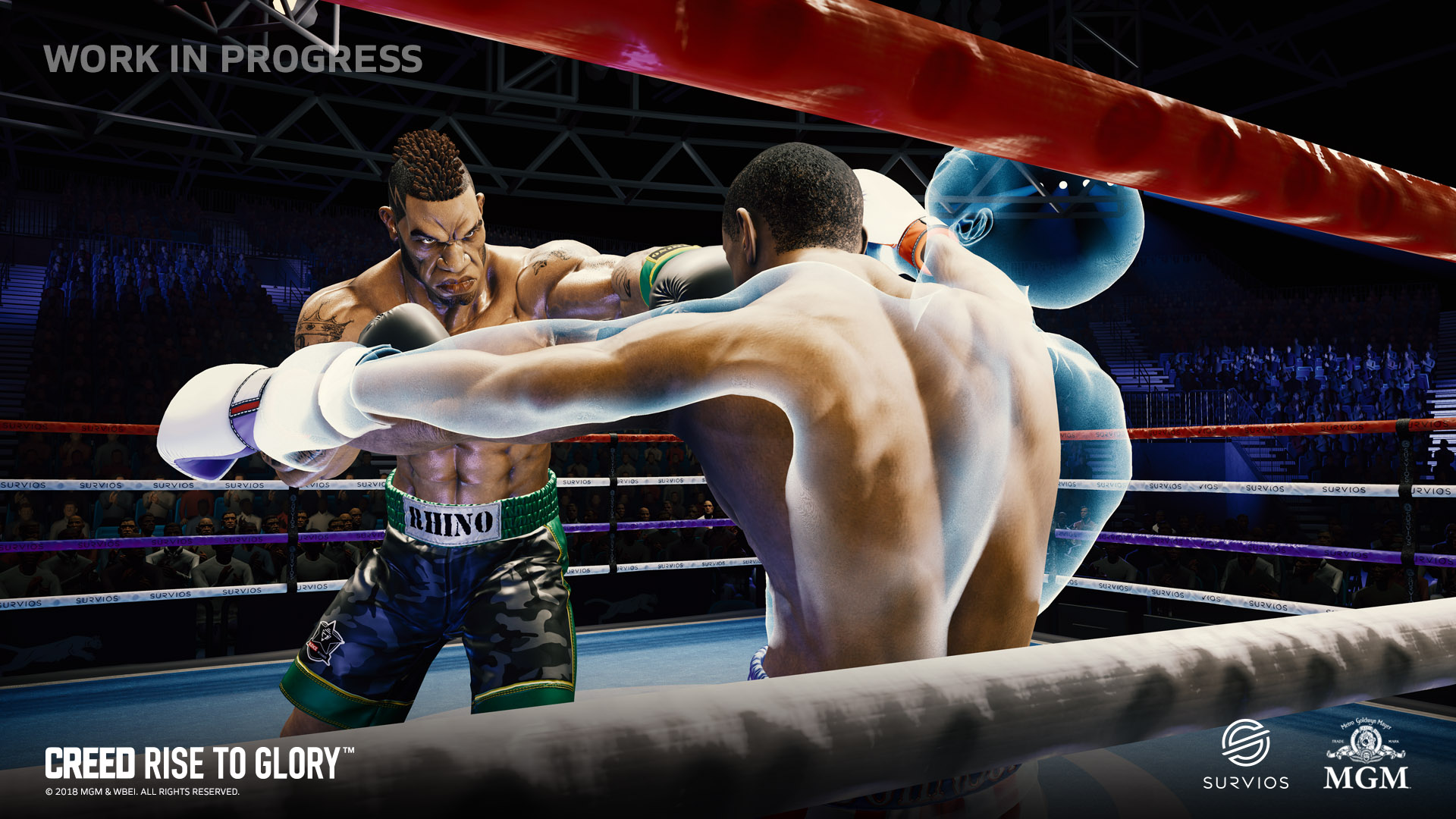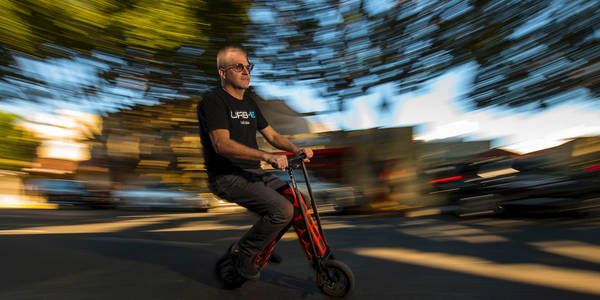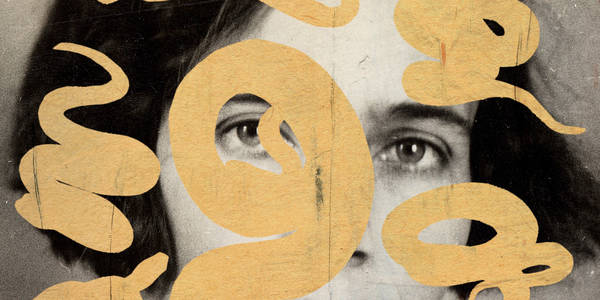feature / alumni / advertising / film / entertainment-design
May 10, 2018
By Mike Winder
Images courtesy of
Survios and Hearts&Minds
BRAVE AND THE BOLD: SURVIOS AND HEARTS&MINDS LEADERS TO DISCUSS SECRETS OF CONNECTING
In an increasingly noisy world of advertising and marketing—full of hashtags, sponsored lenses and, yes, good old-fashioned word of mouth—how do creatives find the audiences they need to build their brand?
That’s one of several questions to be explored at this year’s BOLD, ArtCenter’s symposium for creative entrepreneurs on Saturday, May 12. And the three individuals speaking at the “Value of Earned, Owned and Paid Marketing” session—Graduate Film alumnus Matthew Pollock (MFA 03) of Hearts&Minds and Maria Gonima and Robert Nashak, both of VR studio Survios—know plenty about connecting with customers in innovative ways.
LEAD WITH THE SPECTACLE
In a corner suite overlooking Marina del Rey you’ll find the headquarters of Hearts&Minds, a creative agency founded in 2016. The first thing you notice walking into the agency’s Silicon Beach offices is a really, really, really bright red wall. The sharp contrast between this hue and the muted coastal colors of the building’s exterior is almost a shock to the system. And that’s the whole point.
Founded by Pollock and Chad Saul—both Innocean and Deutsch LA alums—Hearts&Minds espouses a philosophy of connecting with customers first through emotion and then following up with the rational.
Perhaps the best example of their philosophy in action is an advertisement they created for Wagner that highlights in dramatic fashion the difference that Wagner OEX brake pads—proven to stop 50 feet before their competitors—can make in a dangerous situation.
In the ad, two mothers in two cars, transporting two kids each, drive side by side. They share a moment of acknowledgment which is suddenly interrupted when a truck pulls out in front of them. The mother who used Wagner OEX brakes stops in time to avoid the collision. The other mother? Not so lucky.
The results? Thanks to the emotional appeal, purchase intent of Wagner brake pads increased by 64%, sales more than doubled, and the company gained distribution in two new retailers.
“It’s been a successful spot because people don’t believe brake pads can make a difference,” says Pollock, seated at a modular desk with a view of the marina behind him. “Previously, Wagner had done a number of commercials where Mike Rowe, host of Dirty Jobs, takes a tape measure and explains all the things that can happen in 50 feet.”
“It was a pretty rational way to talk about a rational claim,” adds Saul from the opposite end of the desk. “The direction we took was start with spectacle, then hit them with the rational.”
A less visceral, but no less dramatic, example of Hearts&Minds philosophy can be seen in a spot it created for last week’s Boys and Girls Club National Conference in San Diego, which was screened last week in San Diego for the event’s 3,000 attendees.
A massive organization, Boys and Girls Club of America has 4,000 locations across the country, staffed by 58,000 youth development professionals that collectively help four million kids every year. “The challenge they came to us with was to find a way to rally an organization that large around a single idea,” says Pollock.
The two-minute film incorporates new footage along with text from a speech given by Jim Clark, president and CEO of BGCA, and footage that Hearts&Mind shot for previous spots at locations like the Challengers Boys and Girls Club in South Los Angeles—one of the organization’s first clubs—and Kip’s Boys & Girls Club in the Bronx.
Beyond rallying the organization's members, Pollock adds that pinpointing the messaging in an emotional manner also encourages individuals to donate. “As a donor, if you can really understand what an organization does and where your money goes, you’ll see why it’s important to support it financially,” he says.
FOLLOW UP WITH A KNOCKOUT
In an entirely different realm—or, reality, if you will—getting consumers unfamiliar with VR to understand and engage with the experience can be a tricky proposition.
One company well positioned to face that challenge is Century City-based startup Survios, the VR studio behind VR games like Raw Data—which when launched in 2016 went immediately to #1 on the VR charts on STEAM and made $1 million in its first month. Founded in 2013, the studio has raised $54 million in funding and employs 110 individuals, who work inside a large hangar once used to build helicopters.
“During the last two years, we’ve seen the rise of the consumer VR market,” says Nashak, Survios’ chief operating officer who jokes he’s known as “the snowplow” because his job is all about removing obstacles in people’s ways. “But the rate of adoption has been a little tamped down by the high cost of the hardware.”
Which is why, Nashak says, the company distributes both its own VR games—and games of its competitors—in arcades in 36 countries around the world. This past January, the company opened its first owned-and-operated arcade in the Del Amo Fashion Center in Torrance.
“Malls are fighting for foot traffic and losing tenants, so they’re very eager for engagement drivers like us to be part of their space,” explains Nashak, while adding that once people try VR, they’ll be more likely to invest in the hardware for home use. “People can’t understand VR and certainly not buy VR until they’ve tried VR.”
Gonima, who leads communications at Survios, says the company’s arcade at the Del Amo Fashion Center is built on the premise that watching people play VR is as fun as playing VR. She adds that many people who visit the arcade have never experienced VR before.
“The most important thing to do is give people the sense that it’s not intimidating to get into a headset,” she says.
Visitors are given a free trial and then encouraged to try either one of Survios’ own games or one of the games the company distributes, which vary from creativity experiences to first-person shooters to recreational activities like virtual bowling. Visitors can choose whether they want to pay for 10 minutes, 60 minutes, several hours, or purchase a membership. “We try to make it as accessible as possible,” says Gonima.
And, Gonima adds, to make VR comfortable, a company needs to bring great energy into the space. “We bring in entertainment, we do DJs, we have hoopers,” she says. “We bring in elements that make it fun for those playing and fun for those are just watching their friends enjoy themselves.”
One game that will be a blast to both play and observe is CREED: Rise to Glory, Survios’ forthcoming collaboration with MGM. Set in the world of the Rocky films, CREED places the player in the the role of boxer Adonis Creed.
The game is about as immersive—and sweaty—as it gets. On top of all the requisite punching, ducking and blocking necessary to fight your opponents, the game features what Survios describes as a “visual player-avatar separation” that requires the player—depending on how hard they’re hit—to either realign their posture with their avatar, or swing their arms to run towards their avatar to exit an out-of-body experience and avoid a KO.
“It’s meant to be cinematic, it’s not meant to be a simulator, so it’s not a direct analog to boxing,” says Gonima. “But it’s meant to make you feel like you’re in there kicking ass.”
Taking place on Saturday, May 12, the BOLD Symposium is a daylong event designed to celebrate and inspire a growing community of entrepreneurs both from ArtCenter and beyond. Register at artcenter.edu/bold.










